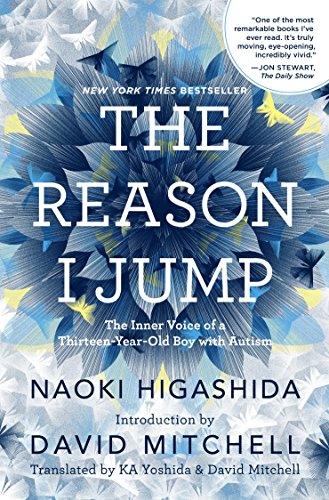The Reason I Jump: The Inner Voice of a Thirteen-Year-Old Boy with Autism / Naoki Higashida, KA Yoshida, David Mitchell,
| List Price: | |
Our Price: $13.59 | |
|
For Bulk orders
| |
|
Used Book Price: | |
| The Reason I Jump: The Inner Voice of a Thirteen-Year-Old Boy with Autism / Naoki Higashida, KA Yoshida, David Mitchell, | |
| Publisher: Random House | |
| Availability: | |
| Sales Rank: 25035 | |
|
Similar Books
Author One-on-One: David Mitchell and Andrew Solomon

David Mitchell is the international bestselling author of Cloud Atlas and four other novels.
Andrew Solomon is the author of several books including Far From the Tree and The Noonday Demon.
Andrew Solomon: Why do you think that such narratives from inside autism are so rare--and what do you think allowed Naoki Higashida to find a voice?
David Mitchell: Autism comes in a bewildering and shifting array of shapes, severities, colors and sizes, as you of all writers know, Dr. Solomon, but the common denominator is a difficulty in communication. Naturally, this will impair the ability of a person with autism to compose narratives, for the same reason that deaf composers are thin on the ground, or blind portraitists. While not belittling the Herculean work Naoki and his tutors and parents did when he was learning to type, I also think he got a lucky genetic/neural break: the manifestation of Naoki's autism just happens to be of a type that (a) permitted a cogent communicator to develop behind his initial speechlessness, and (b) then did not entomb this communicator by preventing him from writing. This combination appears to be rare.
AS: What, in your view, is the relationship between language and intelligence? How do autistic people who have no expressive language best manifest their intelligence?
DM: It would be unwise to describe a relationship between two abstract nouns without having a decent intellectual grip on what those nouns are. Language, sure, the means by which we communicate: but intelligence is to definition what Teflon is to warm cooking oil. I feel most at home in the school that talks about 'intelligences' rather than intelligence in the singular, whereby intelligence is a fuzzy cluster of aptitudes: numerical, emotional, logical, abstract, artistic, 'common sense' – and linguistic. In this model, language is one subset of intelligence – and, Homo sapiens being the communicative, cooperative bunch that we are, rather a crucial one, for without linguistic intelligence it's hard to express (or even verify the existence of) the other types. I guess that people with autism who have no expressive language manifest their intelligence the same way you would if duct tape were put over your mouth and a 'Men in Black'-style memory zapper removed your ability to write: by identifying problems and solving them. I want a chocky bicky, but the cookie jar's too high: I'll get the stool and stand on it. Or, Dad's telling me I have to have my socks on before I can play on his iPhone, but I'd rather be barefoot: I'll pull the tops of my socks over my toes, so he can't say they aren't on, then I'll get the iPhone. Or, This game needs me to add 7+4: I'll input 12, no, that's no good, try 11, yep...
AS: Naoki Higashida comes off as very charming, but describes being very difficult for his parents. Do you think that the slightly self-mocking humor he shows will give him an easier life than he'd have had without the charm?
DM: Definitely. Humor is a delightful sensation, and an antidote to many ills. I feel that it is linked to wisdom, but I'm neither wise nor funny enough to have ever worked out quite how they intertwine.
AS: As you translated this book from the Japanese, did you feel you could represent his voice much as it was in his native language? Did you find that there are Japanese ways of thinking that required as much translation from you and your wife as autistic ways required of the author?
DM: Our goal was to write the book as Naoki would have done if he was a 13 year-old British kid with autism, rather than a 13 year-old Japanese kid with autism. Once we had identified that goal, many of the 1001 choices you make while translating became clear. Phrasal and lexical repetition is less of a vice in Japanese –- it's almost a virtue –- so varying Naoki's phrasing, while keeping the meaning, was a ball we had to keep our eyes on. Linguistic directness can come over as vulgar in Japanese, but this is more of a problem when Japanese is the Into language than when it is the Out Of language. The only other regular head-bender is the rendering of onomatopoeia, for which Japanese has a synaesthetic genius – not just animal sounds, but qualities of light, or texture, or motion. Those puzzles were fun, though
AS: Higashida has written dream-like stories that punctuate the narrative. Can you say what functional or narrative purpose they serve in the book?
DM: Their inclusion was, I guess, an idea of the book's original Japanese editor, for whom I can't speak. But for me they provide little coffee breaks from the Q&A, as well as showing that Naoki can write creatively and in slightly different styles. The story at the end is an attempt to show us neurotypicals what it would feel like if we couldn't communicate. The story is, in a way, The Reason I Jump but re-framed and re-hung in fictional form. They also prove that Naoki is capable of metaphor and analogy.
AS: The book came out in its original form in Japan some years ago. Do you know what has happened to the author since the book was published?
DM: Naoki has had a number of other books about autism published in Japan, both prior to and after Jump. He's now about 20, and he's doing okay. He receives invitations to talk about autism at various universities and institutions throughout Japan. This involves him reading 2a presentation aloud, and taking questions from the audience, which he answers by typing. This isn't easy for him, but he usually manages okay. In terms of public knowledge about autism, Europe is a decade behind the States, and Japan's about a decade behind us, and Naoki would view his role as that of an autism advocate, to close that gap. (I happen to know that in a city the size of Hiroshima, of well over a million people, there isn't a single doctor qualified to give a diagnosis of autism.)
Now you can buy Books online in USA,UK, India and more than 100 countries.
*Terms and Conditions apply
Disclaimer: All product data on this page belongs to
 .
.No guarantees are made as to accuracy of prices and information.










